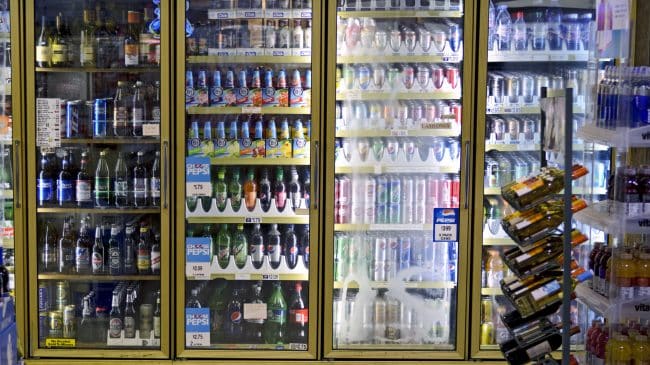Sometimes, consuming a product the government doesn’t like comes at an extra cost. Across the United States, taxes on cigarettes, alcohol, fast food, and soda—often referred to as sin taxes—are meant to nudge consumers in a healthier direction and raise revenue.
Philadelphia became the first major city to approve a tax on sugar-sweetened and diet beverages in 2016. Because the tax was originally devised to raise revenue, beverages sweetened with non-caloric sweeteners are still taxed in addition to arguably healthy beverages like Gatorade and almond milk.
In May the Pennsylvania Supreme Court heard oral arguments on a challenge to Philadelphia’s soda tax brought by the American Beverage Association and other groups. The case concerns whether the 1.5-cents-per-ounce tax is a violation of the Sterling Act, which prevents the city from taxing items already taxed by the state. In an attempt to get around the law, the tax is levied on distributors but inevitably passed on to consumers who already pay a state sales tax. The Pennsylvania Commonwealth Court heard the case last year and sided with the city.
City officials argue that the benefits of the tax are twofold: it raises necessary revenue for early education programs and also curbs unhealthy behavior. When the tax was passed two years ago, former New York City Mayor Michael Bloomberg, who donated $1.6 million to support the cause, commented, “Obesity and poverty are both intractable national problems. No policy takes more direct aim at both than Philadelphia’s tax on sugary drinks.”
The problem is that these goals are incompatible. In order for the tax to fund early education, people need to buy lots of sugary beverages. If the tax succeeds in deterring unhealthy behavior, education programs don’t get much funding.
Early on, the tax has fallen short of supporters’ revenue goals. For the fiscal year 2017, the goal was to raise $46 million between January and the end of June. Collections reached about $39.5 million—15 percent below original estimates. If public education and other programs funded by the tax are truly important, they deserve a more reliable source of funding.
Funding shortfalls do not necessarily mean that the tax is deterring unhealthy consumption either. Instead, research from Oxford Economics found that consumers are engaging in tax avoidance strategies. Wholesale bottler’s sales fell by 29 percent in the city but rose by 26 percent immediately outside of city limits, suggesting that consumers may be traveling outside of Philadelphia just to avoid the tax. Similarly, beverage sales in supermarkets fell by 24 percent between early 2016 and 2017 while sales outside the city increased by 14 percent. Those who still shopped within city limits also found a way to get their sugary beverage fix without the tax: sugary drink powder sales increased by 29 percent and sales of instant tea mixes went up 32 percent (sales for the same mixes were up by only two and three percent outside the city).
There is also evidence that some consumers are doing all of their grocery shopping outside city limits, suggesting that the soda tax has driven them to shift their consumption away from local retailers. There has been a seven percent decline in non-beverage grocery store purchases inside the city. Store owner Eduard Medina has seen shoppers heading into the suburbs to buy all of their groceries and he says the tax has made “running a supermarket in a poor neighborhood in Philadelphia uneconomical.” Medina warns that if supermarkets go out of business, the limited access to healthy food could result in worse health outcomes.
As a result of the tax, Oxford Economics estimated that Philadelphia lost 1,192 workers, an $80 million annual decrease in GDP and a $4.5 million reduction in tax revenue due to jobs lost in the bottling and grocery industries. In 2017, the tax only raised $78.8 million.
Mayor Jim Kenney claimed that the soda tax would be a tax on corporations and force them to give “back to the communities they have reaped millions in profits from for decades.” Yet those who are most likely to lose their jobs or see a reduction in hours from the tax are store clerks and truck drivers. In a metropolitan area, working-class shoppers may not be able to drive into the suburbs to buy soda and those without access to transportation end up paying more.
Low-income consumers are already more likely to consume sugary beverages. A study conducted by the Center for Disease Control looking at six different U.S. states found that approximately 32 percent of those with income less than $25,000 per year drank one serving of sugary beverage per day compared to only 16 percent of those making over $75,000. As income level rose, sugary drink consumption fell. Both the brunt of the tax and the unintended consequences of it are paid by low- and middle-income Philadelphians.
The state Supreme Court has not yet announced when it will reach a decision. Mark Aronchick, a lawyer for the city, promised that if the tax is upheld, there will still be a line in the sand to prevent excessive taxation. “The line is going to be politics,” he said. “Politicians don’t get up every morning saying ‘Hey, what can I tax?'”
If the court sides with the plaintiffs, not only will Philadelphia lawmakers be restricted in what products they can tax, but beverage taxes across the country could be vulnerable to legal challenges.
